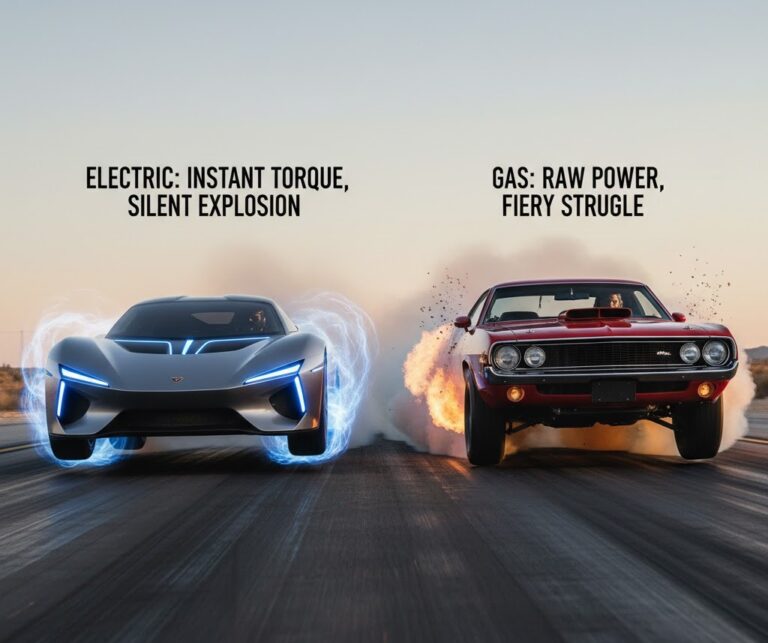TL;DR:
– The article explores key performance metrics for gas vs electric vehicles, emphasizing horsepower, torque, acceleration, and fuel efficiency.
– Gas engines provide advantages in raw power and engine response, but come with higher maintenance needs.
– Electric vehicles (EVs) excel with instant torque, significant range considerations, and the benefits of regenerative braking.
– Environmental impacts differ, with gas engines creating emissions while EVs face challenges from battery production and regulatory frameworks.
– Choosing between gas and electric vehicles depends on individual driving habits, a cost-benefit analysis, and the potential for future innovations in performance.
Introduction
Gas vs electric performance is a hot topic as we gear up for 2025. The automotive landscape is shifting, and understanding these two powertrains can make all the difference. Gas engines have long been the standard, delivering horsepower and a thrilling driving experience. But electric vehicles are not just a novelty anymore; they’re redefining speed, torque, and efficiency. As an industry expert, I’ve seen how advancements in battery technology and regenerative braking have leveled the playing field. In this article, we’ll explore what you need to know about gas and electric vehicles, their performance metrics, and which option might be the better fit for you. Buckle up—this performance battle is just getting started!
What Are the Key Performance Metrics for Gas vs Electric Vehicles?
Are you curious about how gas and electric vehicles stack up against each other in terms of performance? Understanding the key performance metrics is essential for making informed choices, especially as the automotive landscape continues to evolve. If you’re weighing the options between gas vs electric performance, this breakdown will provide clarity on important factors like horsepower, torque, acceleration, and fuel efficiency.
How Do Horsepower and Torque Compare?
When comparing gas vs electric performance, horsepower and torque play pivotal roles in determining a vehicle’s capabilities. Horsepower indicates the overall power output, while torque measures the force that drives the vehicle forward. Gas engines often produce higher horsepower, which is crucial for high-speed performance. However, electric vehicles (EVs) deliver impressive torque from a standstill, resulting in a thrilling acceleration that muitos drivers find appealing.
What Role Does Acceleration Play in Performance?
Acceleration is a major benchmark when evaluating vehicle performance. Gas vehicles traditionally excel in top-speed capabilities, adding to their allure for speed enthusiasts. On the other hand, electric vehicles benefit from their instant torque, allowing them to achieve rapid acceleration in a shorter timeframe. This means that while a gas vehicle may edge out in the long run, EVs often triumph in initial bursts, making them feel more responsive around town.
How Is Fuel Efficiency Measured in Both Powertrains?
Fuel efficiency is a critical factor to consider when looking at gas vs electric performance. For gas vehicles, efficiency is measured in miles per gallon (MPG), indicating how far a car can travel on a gallon of fuel. In contrast, electric vehicles use miles per gallon of gasoline equivalent (MPGe), representing how they measure against traditional fuel consumption. While gas vehicles may offer longer ranges, EVs outperform them in terms of efficiency, providing lower operational costs over time.
For further insights on performance metrics and comparisons, you can check out resources from “Edmunds.”
What Are the Advantages of Gas Engines in Performance?
When it comes to performance, gas engines provide unique benefits that can greatly enhance the driving experience. With the ongoing debate surrounding gas vs electric performance, understanding the specific advantages of gas engines is crucial for car enthusiasts and casual drivers alike.
Do Gas Engines Offer More Power for Speed?
Gas engines are often celebrated for their ability to generate high horsepower and torque, translating to increased speed and acceleration. This is particularly evident in high-performance vehicles where a gas engine’s design allows for rapid fuel combustion, giving it the edge when it comes to raw power. Key advantages include:
– **Higher Horsepower Ratings**: Many gas engines boast horsepower ratings that outpace those of their electric counterparts, especially in traditional sports cars.
– **Rev Range**: Gas engines typically deliver power across a broader rev range, enabling faster acceleration during dynamic driving conditions.
How Does Engine Response Affect Driving Experience?
The responsiveness of a gas engine significantly influences the overall driving experience. Drivers often appreciate the visceral feedback from gas engines, marked by audible engine sounds and the sensation of power delivery. Considerations include:
– **Throttle Response**: Gas engines tend to have a more linear throttle response, giving drivers control and predictability during acceleration.
– **Driving Dynamics**: The feeling of direct connection to the engine enhances the engagement and satisfaction for many driving enthusiasts.
What Are the Maintenance Implications for Gas Vehicles?
While gas engines provide numerous performance benefits, they also come with maintenance considerations that potential buyers should be aware of. Key points to consider include:
– **Routine Maintenance**: Gas engines generally require more frequent oil changes, fuel system cleaning, and exhaust maintenance.
– **Long-term Costs**: Although gas vehicles often have lower initial costs, ongoing maintenance might lead to higher long-term expenses compared to electric vehicles.
In conclusion, while both gas and electric vehicles have their merits, gas engines offer distinct advantages in terms of power, response, and maintenance that can be particularly appealing to performance-oriented drivers.
For more insights, visit “Car and Driver”, “Motor Trend”, “Edmunds”, “U.S. News & World Report”, “Kelley Blue Book”, and “Automobile Magazine”.
How Do Electric Vehicles Compete in Performance Metrics?
What truly defines an electric vehicle’s (EV) performance when stacked against traditional gas-powered cars? In recent years, electric vehicles have surged in popularity, prompting a closer look at how they compare in critical performance metrics. Understanding these differences can guide your choice between gas vs electric performance, particularly as advancements continue to reshape the automotive landscape.
What Is the Significance of Instant Torque in EVs?
One of the standout features of electric vehicles is their ability to deliver instant torque. Unlike gas engines, which require time to build up speed, EVs provide immediate acceleration from a standstill, making them incredibly responsive. This instant energy translates into dynamic driving experiences, whether you’re merging onto highways or navigating urban traffic. For instance, many modern EVs can sprint from 0 to 60 mph in under four seconds, offering thrill-seekers a sensation that gas vehicles often struggle to match.
How Does Range Impact Performance Perception?
Range remains a crucial performance metric for electric vehicles. While many gas cars offer extensive ranges due to their fuel capacities, EVs are catching up with advancements in battery technology. The perception of performance is often tied to how far a vehicle can go on a single charge. For instance, popular models like the Tesla Model 3 can travel over 300 miles, alleviating common range anxiety and bolstering user confidence in EV performance. By addressing range concerns, manufacturers enhance the overall appeal of electric vehicles in comparison to traditional models.
What Are the Benefits of Regenerative Braking?
Regenerative braking is another performance metric where electric vehicles shine. This technology captures energy typically lost during braking and feeds it back into the battery, enhancing overall efficiency and range. As a result, drivers experience less wear on brake components and can enjoy longer intervals between maintenance. Additionally, regenerative braking contributes to a smoother driving experience, helping EVs feel more connected to the road. Drivers can control the vehicle’s deceleration seamlessly, making each ride not only efficient but also enjoyable.
For further insights on performance metrics, check out comprehensive resources from sources like “Edmunds,” “Car and Driver,” and “Consumer Reports.” Understand more about the advancements in electric vehicle technology through articles on “MotorTrend” and “AutoWeek.” Finally, to navigate the future landscape of automotive choices, refer to insights from “J.D. Power”
What Are the Environmental Considerations Between Gas and Electric Options?
How do gas and electric vehicles stack up against each other when it comes to environmental impact? As the automotive industry shifts towards sustainability, understanding these differences is crucial for eco-conscious consumers. The performance of gas vs electric vehicles doesn’t just hinge on speed and efficiency; it’s also about their environmental footprints.
How Do Emissions Differ Between the Two Powertrains?
Gasoline engines produce significant greenhouse gas emissions, contributing to climate change and air pollution. Electric vehicles (EVs), on the other hand, emit no tailpipe pollutants. However, the source of electricity matters; coal-powered plants can offset EV benefits. Studies suggest that even accounting for emissions from electric generation, EVs can lead to up to 40% lower lifetime emissions compared to gas vehicles (source: Union of Concerned Scientists).
What Is the Environmental Impact of Battery Production?
While EVs boast lower operational emissions, their battery production is resource-intensive. Mining lithium, cobalt, and nickel for batteries can harm ecosystems and communities. However, initiatives to improve recycling processes and develop sustainable mining practices are emerging, which could mitigate these impacts in the future (source: International Energy Agency).
How Are Regulations Shaping the Future of Both Technologies?
Government regulations are increasingly favoring electric vehicle adoption through incentives, stricter emissions standards, and long-term goals to phase out fossil fuel vehicles. Policies like California’s Advanced Clean Cars program drive innovation in EV technology, leading to improvements in both performance and environmental sustainability (source: California Air Resources Board). As these regulations evolve, they will play a pivotal role in shaping consumer choices in the gas vs electric performance debate.
For more insights on the environmental considerations of gas and electric vehicles, refer to resources from “Environmental Protection Agency,” “National Geographic,” “World Resources Institute,” “Electric Power Research Institute,” “Green Car Reports,” and “Forbes.”
Which Vehicle Type Might Be Best for Your Needs?
Choosing between gas and electric vehicles can significantly impact your driving experience, costs, and environmental footprint. If you’re pondering which option best suits your lifestyle, understanding your driving habits and analyzing the cost-benefit ratio is essential.
How Do Driving Habits Influence Your Choice?
Your daily commuting patterns heavily influence your vehicle choice. Frequent long drives may favor gas vehicles for their established refueling infrastructure. Conversely, if most of your trips are shorter, an electric vehicle (EV) allows for easy charging at home and may reduce fuel costs. Evaluate factors like:
– Daily mileage
– Access to charging stations
– Driving conditions
Understanding these elements will guide you in selecting the vehicle that aligns with your routine.
What Is the Cost-Benefit Analysis of Gas vs Electric?
Financial considerations are critical in your vehicle choice. While gas vehicles often have lower upfront costs, electric vehicles can offer long-term savings through reduced fuel expenses and tax incentives. Additionally, consider:
– Maintenance costs: EVs usually require less upkeep.
– Fuel prices: Gasoline rates fluctuate, while electricity tends to remain stable.
– Depreciation rates: Some EVs retain their value better due to increasing demand.
Making a well-rounded financial analysis can help determine the most economical choice for your needs.
Are There Future Innovations on the Horizon That Could Change the Game?
The automotive landscape is evolving rapidly, with innovations on the horizon that could impact gas vs electric dynamics. Upcoming technologies include:
– Advanced battery systems, promising longer ranges and quicker charging
– Enhanced charging infrastructure, making EVs more viable for all drivers
– Hybrid technologies bridging gaps between gas and electric
Staying informed about these trends can help you choose a vehicle that meets your expectations now and adapts to future advancements.
For further understanding, consider checking resources from the “U.S. Department of Energy,” “Edmunds,” “Consumer Reports,” “Forbes,” “Car and Driver,” and “The Verge.”
Conclusion:
In summary, the discussion surrounding gas vs electric performance highlights key differences in efficiency, power delivery, and environmental impact. Gas systems often excel in performance and reliability, while electric alternatives are increasingly recognized for their sustainability and long-term cost-effectiveness. Each option presents unique advantages that cater to different preferences and needs. As you navigate your choices, consider how these insights can influence your decisions. For a deeper understanding of energy solutions and their implications, explore our other articles to stay informed and empowered in your energy journey.



